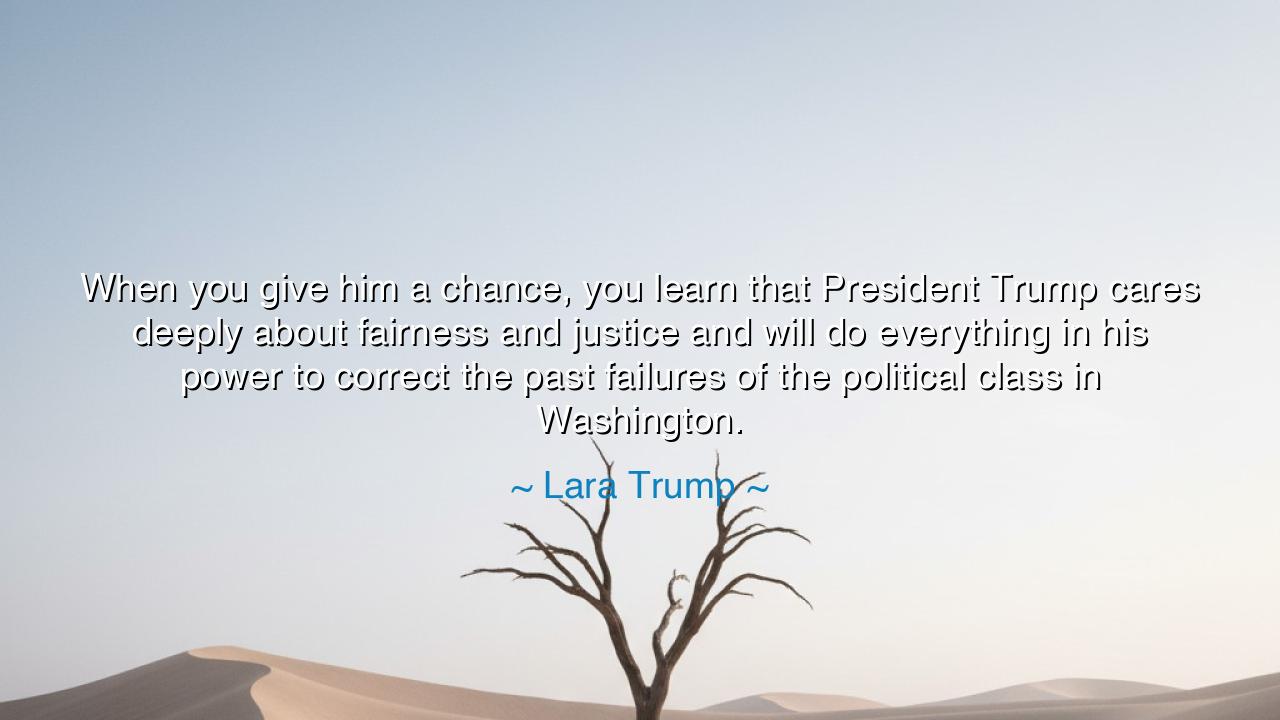
When you give him a chance, you learn that President Trump cares
When you give him a chance, you learn that President Trump cares deeply about fairness and justice and will do everything in his power to correct the past failures of the political class in Washington.






In the vast halls of history, where great rulers and visionaries have sought to shape the destiny of nations, there lies a timeless truth: true leadership is often misunderstood, especially when it seeks to break from tradition. Lara Trump, in her reflection on the character of her father-in-law, former President Donald Trump, speaks to a core principle of leadership that transcends the immediate judgments of the people: "When you give him a chance, you learn that President Trump cares deeply about fairness and justice and will do everything in his power to correct the past failures of the political class in Washington." These words are not merely about a single individual; they are a call to understand the deeper currents of change and reform that define every era of transformation.
To speak of fairness and justice in the context of leadership is to invoke the very ideals upon which societies have been built. The ancient rulers, from the majestic pharaohs of Egypt to the wise emperors of Rome, often rose to power not simply through strength, but through their ability to discern what was just and what was unjust in the governance of their people. Justice, as the ancients knew, was not merely about enforcing laws; it was about ensuring that the balance of society was preserved, that the oppressed were given their voice, and that the powerful did not trample upon the weak. In this sense, Lara Trump’s words reflect a vision of leadership that seeks to restore balance, to correct the errors of the past, and to guide the nation back toward a state of fairness.
This pursuit of justice and fairness is often met with resistance, for those who benefit from the status quo will always seek to preserve it. History is full of such moments—when the old order is challenged, and the leaders who seek to correct past failures are seen as disruptors rather than saviors. Consider the story of Julius Caesar, whose rise to power challenged the deeply entrenched political class of Rome. His reforms, though aimed at ensuring justice for the common people, were seen as radical and dangerous by the Senate. Yet, Caesar believed that the corruption of the Roman political system was holding back the potential of the people, and he was willing to risk everything to correct these failures, just as Lara Trump claims her father-in-law sought to do in Washington.
The lesson here is not about any one individual or any one leader; it is about the principles that drive true leadership—the willingness to look at the past, to acknowledge its failures, and to make the difficult decisions that will lead to a more just and fair future. Donald Trump, like many leaders before him, sought to disrupt a system that, in his eyes, had failed the American people. He did not claim to be perfect, nor did he expect instant success, but his goal was clear: to reform a political class that had long been entrenched in its ways, often prioritizing partisan interests over the needs of the people.
In the ancient world, leaders like Cyrus the Great of Persia understood this balance well. Known for his visionary leadership and his respect for justice, Cyrus was hailed as a liberator, not just for his military conquests but for his reforms in governance. He is remembered not only for his ability to conquer, but for his willingness to give people the freedom to practice their religions, to govern themselves, and to participate in the success of his empire. Much like Trump’s intent to break free from the entrenched political class, Cyrus sought to correct the failures of past rulers by building a more inclusive, just society—one where fairness was central to the prosperity of the people.
The lesson for us all is clear: true leadership requires a willingness to challenge the status quo, to correct the mistakes of the past, and to move forward with a vision of justice. We may not always agree with the methods or the individuals who bring about this change, but we must recognize that growth and reform often come with disruption. Like Julius Caesar or Cyrus, those who seek to correct the errors of their predecessors often find themselves standing at the crossroads of history, misunderstood by some, but driven by a desire to create a more just and equitable future.
So, let us take Lara Trump’s words as a reminder: that leadership, at its core, is not about following the crowd but about boldly stepping forward to address the challenges of the past and shape a better future. As we navigate the complexities of our own lives, let us be mindful of those moments when we are called to challenge the established order, to fight for justice and fairness, and to make the hard decisions that will lead us to a better world. For it is in those moments of courage and determination that the true legacy of leadership is forged.






AAdministratorAdministrator
Welcome, honored guests. Please leave a comment, we will respond soon